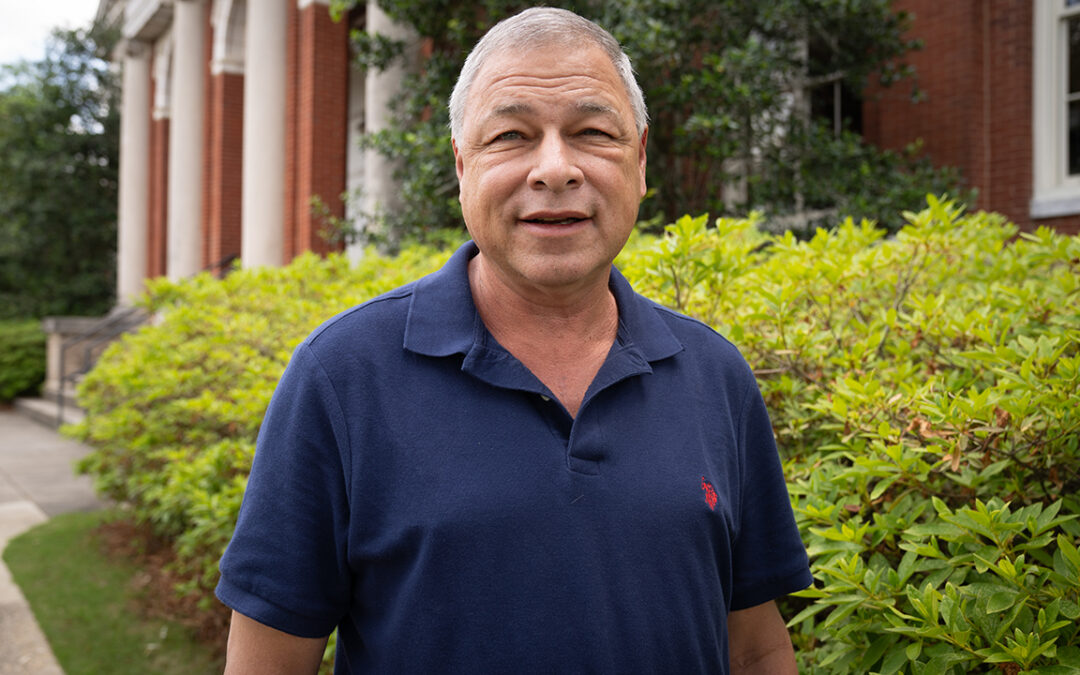By Paul Hollis
A research team led by Auburn University is working to help peanut farmers maintain and improve their production in a changing environment that’s certain to include increasingly limited water resources.
“Adequate water availability for all crops is an increasing concern due to competition for water resources and increased drought frequency,” said Charles Chen, professor in the College of Agriculture’s Department of Crop, Soil and Environmental Sciences and Alabama Agricultural Experiment Station researcher.
While peanuts are relatively drought tolerant compared to other crops, they’re still susceptible, and Alabama lags behind neighboring states in the amount of cropland that is irrigated, Chen said.
“The overall goal of our research is to develop near-term solutions that can be implemented by peanut producers to mitigate drought, improve water-use efficiency and improve the environmental footprint of peanut production,” he said.
The research is funded through a partnership of USDA’s National Institute of Food and Agriculture, or NIFA, and the National Peanut Board. Auburn’s $294,000 grant is one of four totaling $1.4 million, with other recipients being USDA’s Agricultural Research Service, Southern Region; Virginia Polytechnic Institute & State University; and Texas A&M University.
The total project—consisting of $1 million from NIFA and $400,000 from the peanut board—focuses on two issues: the accurate diagnosis of peanut and food allergies and continuous improvements in water-use efficiency in peanuts.
Chen, who is working with the National Peanut Research Laboratory in Dawson, Georgia, on the latter issue, said there are three objectives to the research he is leading.
“From a genetic or breeding standpoint, we want to find any genetic resistance to drought tolerance,” he said. “We want to find those genetic materials and integrate the drought-tolerant trait into the breeding program.”
Objective two, Chen said, is to determine what kind of gene controls drought tolerance and understand that mechanism from a genetic perspective.
“The third objective—which involves more applied research—will be to develop irrigation schemes that enhance water-use efficiency, improve nutrient uptake and maintain or improve yield and quality with the best economic returns for drought-tolerant cultivars and breeding lines,” he said.
Mitigating drought in peanuts also will play a role in food safety, Chen said. “If drought negatively affects yields, it can predispose peanuts to aflatoxin contamination, which limits their suitability for human consumption.”
To help identify drought tolerance in peanuts and facilitate the development of new, drought-tolerant varieties, researchers will take an integrated approach that utilizes agronomy, physiology, molecular biology and genetics, Ron Sorensen, research agronomist at the national peanut lab, said.
To characterize physiological and molecular traits for drought tolerance, peanuts will be grown in environmentally controlled small plots located at the Dawson lab and will be subjected to drought treatment during the growing season. Physiological measurements will be conducted on both the drought and the control plants.
“Key molecular and biochemical components of drought response regulation will be identified, comparing samples from drought-tolerant and susceptible peanut genotypes,” Sorensen said. “Identification of drought-regulated genes then will be utilized to select new peanut lines with drought tolerance.”
In field trials at both Dawson and the Wiregrass Research and Extension Center in Headland, researchers will evaluate potential or newly released peanut lines to verify their yield and quality in relation to drought conditions. Peanuts will be irrigated at various levels and then harvested and tested.
Data collected will include total irrigation and rainfall amounts to determine the water-use efficiency of each peanut line. All yield, quality and water-use efficiency data for each irrigation rate and peanut line will be analyzed to help determine drought-resistance characteristics.
In addition to Chen and Sorenson, members of the research team include Auburn Department of Crop, Soil and Environmental Sciences faculty members Yucheng Feng and Audrey Gamble and research associate Kris Balkcom, Marshall Lamb and Phat Dang of the National Peanut Research Lab and Texas A&M faculty member Julie Howe.




